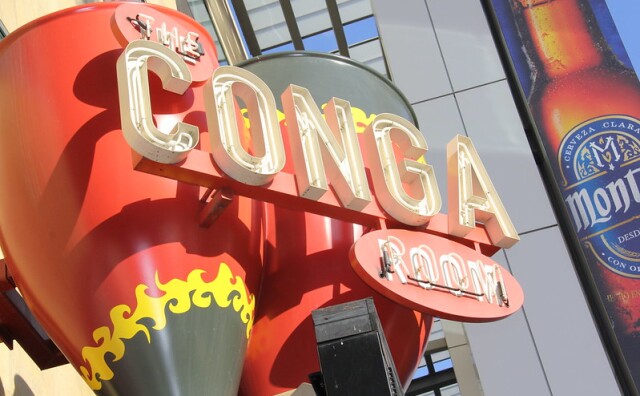This review does not need a spoiler alert. After all, every facet of the O.J. Simpson trial has been chronicled in painstaking detail since 1994: there have been hundreds of books written about the Trial of the Century, "The Juice" himself, the personal lives of those involved, and the political and personal relationships that swirled around the case. American Crime Story: The People v. O.J. Simpson, produced by Ryan Murphy as a "companion series" to the American Horror Story anthology, is sourced from Jeffrey Toobin's book, The Run Of His Life. It's less about determining if O.J. did it (because it's very clear the author believes he did), than it is behind-the-scenes exploration of the trial, and the context in which everything went down.So for a story that's been told a million times, and interpreted and analyzed from dozens of angles, how might this version be different?
The People v. O.J. Simpson is suspenseful, emotionally gripping, and an utter thrill to watch as it explores the inner lives and conflicts of those involved in the case, the iconic details of the investigation, litigation strategies, and the thematic intersections of race, class, gender, politics, fame, and the justice system that were ripped open by the trial. Unlike the dime a dozen, one-sided crime procedurals that seem to operate on the premise, "guilty until proven innocent," The People v. O.J. Simpson deftly shows that it's never as simple as picking a side.
I wrote "LOL" in my notes a total of 41 times. It wasn't because it was outrageous or silly, but rather because it was so (forgive the pun) juicy and so surprisingly thrilling I couldn't help but joyfully exclaim. The stellar acting, smart, witty script, the dramatic cinematography, and of course the Kardashian kid kameos, were highly amusing. When I told a friend how much I loved the show she I assumed that I meant it was "bad-good." But no. It's very much "good-good."
Footage of the 1992 Rodney King beating, trial, and subsequent riots introduces the series as a sort of preamble—a smart choice by Murphy. Placing the trial in the context of a notoriously racist LAPD was a theme that dominated the Simpson trial, as it does on a more micro level between the characters on the show.
Jumping ahead two years later, the show opens with a Mulholland Drive-esque scene on a Brentwood street, as a foreboding drone dominates the soundtrack (as it does throughout the series). A neighbor walking his dogs discovers the bloodied, mutilated bodies of Nicole Brown and Ronald Goldman; it's graphic, but this is a Ryan Murphy production after all. What'd you expect?
The show whips through the conventional timeline—discovery, investigation, Bronco chase, arrest, trial—without being simplistic. Because each notch of that timeline unfolds into layers laced with its own surprises and conflicts.
The drama is propelled by the outstanding cast. We have David Schwimmer as Robert Kardashian, the loving, shy best friend to O.J. John Travolta oozes egotistical sleaze as a waxen Robert Shapiro. The many moods of Simpson are sensitively played by Cuba Gooding, Jr. But Courtney B. Vance as Johnnie Cochran totally steals the show, just as the real Cochran stole the trial. He is flamboyant, he is funny, he is an asshole, he is inspiring. I want a Johnnie Cochran spinoff.
Largely because of this I found myself often rooting for O.J.'s defense team, and surprised myself when I was moved to tears during Simpson's moments of deepest despair.
Assistant District Attorney Marcia Clark, brilliantly acted by Sarah Paulson has no sympathy for Simpson whatsoever. Once he's in custody, she puffs a cigarette with relish—she can't wait to bring him down. Clark emerges as a feminist hero, though she certainly was not perceived as such at the time of the trial. She leads her prosecution team with a strategy that flies in the face of gender norms: the all-male defense team appeals to emotion, while Marcia focuses on rationality, on hard evidence. At her peril, too. She was hated in the media, ragged on for her appearance, openly called a bitch. All things none of the male lawyers on O.J.'s "Dream Team" ever had to deal with. It's also crucial to note she has a life size poster of Jim Morrison up in her office.
But even Clark, too, is imperfect. She's prone to her own moments of racist prejudice and all-too-eagerly to pushes for the (systemically racist) death penalty.
Amid the clashes between the attorneys, weighty discussions of racial politics, police corruption, and horrific accounts of the murders themselves, it's heavy stuff. But there are (welcome) lighter moments, too.
One of the most tongue-in-cheek asides comes right as Robert Kardashian is rising, becoming known as "The O.J. Guy" from T.V. He tells his kids at lunch: "We are Kardashians. And in this family, being a good person and a loyal friend is more important than being famous. Fame is fleeting, it's hollow. It means nothing at all without a virtuous heart." Cut to the dead, bored eyes of kiddie Kim. Another delightful montage was a flashback of O.J. and Robert in a club blowing rails of cocaine off a woman's breasts to C+C Factory's "Everybody Dance Now." Again: Ryan Murphy, everybody.
The brilliance in The People v. O.J. Simpson is that we see the inner lives—albeit, dramatized—of those closest to the case: Marcia Clark's solitary cigarette breaks; Cochran rehearsing his opening statement while wearing yellow silk pajamas; prosecutor Christopher Darden wrestling with the notion that he was an "Uncle Tom." These are the most powerful moments of the show, and is something a straight documentary simply couldn't give us.
As the daughter of a criminal defense attorney who's represented murderers, it's hard for me to restrain sympathy for the accused. I don't believe that a criminal is ever just that, which was certainly how I felt about O.J. while watching this show—whether or not he "did it" is not the issue. Just this week, Dr. Bennet Omalu, the neuropathologist who discovered chronic traumatic encephalopathy (CTE) in football players, said he would "bet [his] medical license" that O.J. has CTE. Symptoms include "explosive, impulsive behavior, impaired judgment, criminality and even mood disorders."
But as a woman, accounts of Simpson's previous domestic abuse hit too close to home, and that this behavior was just a preamble to the murders of Brown and Goldman makes it even more sickening. It's a strange feeling to wrestle with ever-fluctuating contradictions in emotion, logic and ethics. What most moved me about The People v. O.J. Simpson is that it, too, walks this line, cleverly and sensitively embracing nuance while still delivering knockout drama. It's truly inspiring storytelling.
The People v. O.J. Simpson: American Crime Story premieres tonight at 10 p.m. on FX.






